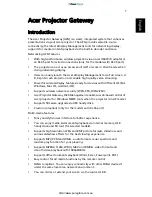
WHA-GW-*
Operation
22
1981
2011
-0
7
83
If there are problems with other wireless technologies disrupting the
Wireless
HART
network, you should configure the Gateway to skip certain channels known to provide
persistent interference (Blacklisting). Blacklisting is a user configurable feature and is
useful when other wireless networks are in the physical environment of the
Wireless
HART
network (see chapter 5.4.1).
If possible, also actively manage frequencies used by other networks. If possible block the
usage of certain channels already used by the
Wireless
HART network (frequency
management).
6.5
Modbus Mapping
6.5.1
Overview
The Modbus implementation maps HART dynamic input variables over Modbus input
registers and also uses input registers to provide device-related status information. The
Modbus implementation is based on the following assumptions:
•
The HART CMD 3 dynamic variables are used for Modbus mapping.
•
For Modbus access, CMD 3 publishing must be enabled for all relevant devices.
•
The Gateway caches the relevant CMD 3 information. Modbus commands will therefore
access the internal Gateway memory.
•
Modbus input registers are only supported if they are associated with HART dynamic
input variables.
•
A device can either be a
Wireless
HART device or a wired HART device connected to a
Wireless
HART adapter.
•
Wireless
HART and wired HART devices are mapped independently within the Modbus
input registers. Wired devices are not necessarily mapped consecutive with the
associated
Wireless
HART adapter.
Standard compliance Modbus RTU
Modbus TCP
Physical layer
RS-485
Ethernet
Transmission mode
RTU (binary mode)
–
Baud-rates
1200 bps, 2400 bps, 4800 bps,
9600 bps, 19200 bps,
38400 bps, 57600 bps,
115200 bps
–
Parity
Odd, Even, None
–
Stop bits
1; 1.5; 2
–
Polling address
1...247
–
Capabilities
• Input registers starting at Modbus address 30001
• HART CMD 3 dynamic variables mapped into input registers
• 2 input registers map a single HART dynamic variable
• 32bit HART floating point format used
• Status information mapped on dedicated input registers














































